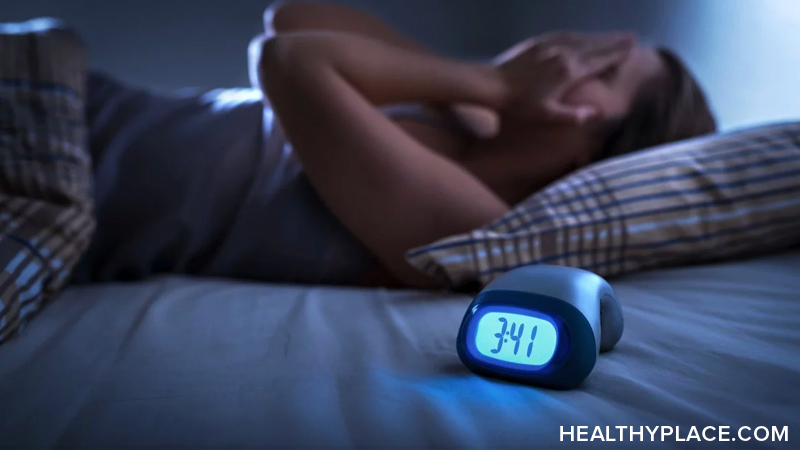Depression Is Causing My Insomnia! What Can I Do?

When depression causes insomnia, dealing with life can become increasingly difficult. If you find yourself having difficulty falling asleep, staying asleep, or both, you are likely experiencing insomnia. Likewise, if you are living with depression and frequently find yourself waking up very early in the morning, unable to fall back asleep, you could have both depression and insomnia. The combination of depression and insomnia can be miserable, but there are things you can do to improve both.
Insomnia in depression is common. It’s estimated that between 65 and 95 percent of people with major depression have sleep problems (Harvard Mental Health Letter, n.d.). Depression involves two general types of sleep problems: insomnia (sleeping too little) or hypersomnia (sleeping too much). In depression, insomnia is much more prevalent than hypersomnia, with 80 percent of people having insomnia (Jaret, n.d.).
Insomnia from depression can exacerbate mental health problems.
- Lack of sleep affects brain chemistry, throwing off neurotransmitters and causing or worsening depression.
- Lying awake, tossing and turning in exhaustion, almost always leads to a barrage of negative thoughts that feed on each other for hours and greet the dawn with you to start the day poorly.
- Insomnia with depression frequently causes anxiety, irritability, lethargy, exhaustion, concentration difficulties, and brain fog.
Depression and insomnia are able to create so many difficulties because they share neural pathways in the brain. Both also disrupt body rhythms making functioning difficult day and night. While this spells trouble for sleep and mood, there is a positive side to their link. You can do things to reduce depression and insomnia. Treating both together can be very effective, and there are tools and techniques you can develop to manage them.
Treating Insomnia and Depression
While they share brain activity, these disorders are two separate conditions with their own treatment approaches. When you and your doctor address each one, your mood and your sleep can improve. Therapy and medication are common treatment approaches to help both.
Medication is often used as treatment because mood and sleep problems are brain-based. Medication works to repair neurotransmitter levels and functioning. Many different types of antidepressant medications and sedative-hypnotic medications are available to treat these disorders. It is sometimes a process of trial-and-error to find the right combination and dosage to help your mood and your sleep. Working closely with your doctor can help you find what works for you.
Mental health therapy is also effective in helping both depression and insomnia. Research studies continue to show the effectiveness of cognitive-behavioral therapy for treating depression. Cognitive-behavioral therapy-Insomnia (CBT-I) is a newer therapeutic approach that has also been shown to effectively treat mood and sleep problems. Both involve addressing and replacing the negative thoughts that plague people with depression. CBT-I has a component that specifically addresses sleep. People learn sleep behaviors, techniques, and positive self-talk to fall asleep and stay asleep.
Tips for Managing Depression and Insomnia
When you work with a therapist to overcome depression and sleeping problems, you’ll gain tools for managing your mental health long-term. The following tips are a sampling of the techniques you might delve into more deeply in therapy. Together, they help you calm both your mind and your body, because mind and body are one unit. You can start using them now to begin to take control of your days and your nights.
- Keep a regular sleep schedule, going to bed and getting out of bed at the same times every day.
- Develop a sleep routine, doing the same things at the same time each night to signal your brain that rest is ahead.
- Create a calming sleep ritual that includes quiet, subdued activities like reading, yoga, meditating, or listening to peaceful, quiet music—and excludes electronics.
- Make your bedroom environment right for sleep, with a comfortable temperature, dim lights, inviting atmosphere, and no computers or televisions.
- Practice slow, deep breathing before bed and when you lie down.
- Write in a gratitude journal before you settle in, reflecting on one or two positives in your day.
- Replace negative thoughts with positive ones from your journal and simple affirmations such as this one: “I may be awake, but I’m relaxed and resting.”
What you do during the day makes a difference in your night, too.
- Move. Depression makes this difficult, but gentle exercise like walking or tai chi, done for even short periods of time, can improve sleep.
- Avoid daytime naps, or keep them less than 20 minutes.
- Refrain from consuming processed or sugary foods, caffeine, and alcohol
Depression and insomnia can be hard to deal with; however, it is possible to not just deal with them but overcome them. Be patient with yourself and consistent in your approach to treat and manage these insidious difficulties. You can feel better and take back your life.
APA Reference
Peterson, T.
(2022, January 4). Depression Is Causing My Insomnia! What Can I Do?, HealthyPlace. Retrieved
on 2026, January 19 from https://www.healthyplace.com/self-help/depression/depression-is-causing-my-insomnia-what-can-i-do



